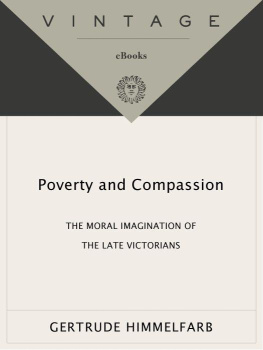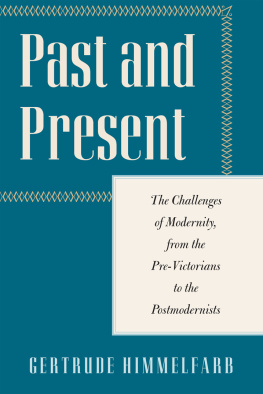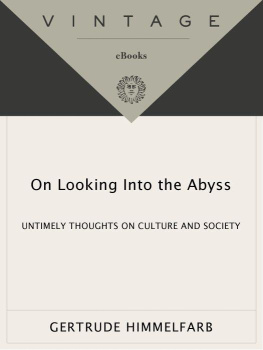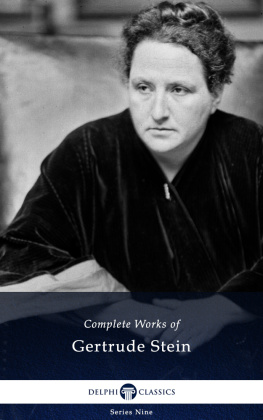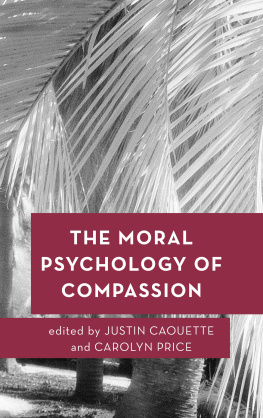Gertrude Himmelfarb - Poverty and Compassion: The Moral Imagination of the Late Victorians.
Here you can read online Gertrude Himmelfarb - Poverty and Compassion: The Moral Imagination of the Late Victorians. full text of the book (entire story) in english for free. Download pdf and epub, get meaning, cover and reviews about this ebook. year: 1991, publisher: Vintage, genre: Politics. Description of the work, (preface) as well as reviews are available. Best literature library LitArk.com created for fans of good reading and offers a wide selection of genres:
Romance novel
Science fiction
Adventure
Detective
Science
History
Home and family
Prose
Art
Politics
Computer
Non-fiction
Religion
Business
Children
Humor
Choose a favorite category and find really read worthwhile books. Enjoy immersion in the world of imagination, feel the emotions of the characters or learn something new for yourself, make an fascinating discovery.
- Book:Poverty and Compassion: The Moral Imagination of the Late Victorians.
- Author:
- Publisher:Vintage
- Genre:
- Year:1991
- Rating:3 / 5
- Favourites:Add to favourites
- Your mark:
- 60
- 1
- 2
- 3
- 4
- 5
Poverty and Compassion: The Moral Imagination of the Late Victorians.: summary, description and annotation
We offer to read an annotation, description, summary or preface (depends on what the author of the book "Poverty and Compassion: The Moral Imagination of the Late Victorians." wrote himself). If you haven't found the necessary information about the book — write in the comments, we will try to find it.
Gertrude Himmelfarb: author's other books
Who wrote Poverty and Compassion: The Moral Imagination of the Late Victorians.? Find out the surname, the name of the author of the book and a list of all author's works by series.
Poverty and Compassion: The Moral Imagination of the Late Victorians. — read online for free the complete book (whole text) full work
Below is the text of the book, divided by pages. System saving the place of the last page read, allows you to conveniently read the book "Poverty and Compassion: The Moral Imagination of the Late Victorians." online for free, without having to search again every time where you left off. Put a bookmark, and you can go to the page where you finished reading at any time.
Font size:
Interval:
Bookmark:
POVERTY AND COMPASSION
Gertrude Himmelfarb is Professor Emeritus of History at the Graduate School of the City University of New York. She is a fellow of the British Academy, the Royal Historical Society, the American Philosophical Society, and the American Academy of Arts and Sciences. Her previous books include Lord Acton: A Study in Conscience and Politics; Darwin and the Darwinian Revolution; On Liberty and Liberalism: The Case of John Stuart Mill; Victorian Minds; The Idea of Poverty: England in the Early Industrial Age; Marriage and Morals Among the Victorians; and The New History and the Old. Miss Himmelfarb has also edited works by Acton, Malthus, and Mill. In 1991 she gave the Jefferson Lecture in the Humanities, under the auspices of the National Endowment for the Humanities.
ALSO BY GERTRUDE HIMMELFARB
The New History and the Old (1987)
Marriage and Morals Among the Victorians (1986)
The Idea of Poverty: England in the Early Industrial Age (1984)
On Liberty and Liberalism: The Case of John Stuart Mill (1974)
Victorian Minds (1968)
Darwin and the Darwinian Revolution (1959)
Lord Acton: A Study in Conscience and Politics (1952)
EDITOR OF
John Stuart Mill, On Liberty (1974)
John Stuart Mill, Essays on Politics and Culture (1962)
T. R. Malthus, On Population (1960)
Lord Acton, Essays on Freedom and Power (1948)

Copyright 1991 by Gertrude Himmelfarb
All rights reserved under International and Pan-American Copyright Conventions. Published in the United States by Vintage Books, a division of Random House, Inc., New York, and simultaneously in Canada by Random House of Canada Limited, Toronto. Originally published in hardcover by Alfred A. Knopf, Inc., New York, in 1991.
Library of Congress Cataloging-in-Publication Data
Himmelfarb, Gertrude.
Poverty and compassion: the moral imagination of the late Victorians / Gertrude Himmelfarb1st Vintage Books ed.
p. cm.
Originally published: New York: Knopf, 1991.
eISBN: 978-0-307-77302-9
1. PoorEnglandHistory19th century. 2. CharitiesEnglandHistory19th century. 3. Great BritainEconomic conditions19th century. I. Title.
HV4086.A3H554 1992
362.5094209034dc20 92-50066
v3.1
For the rising generation
(as a Victorian would say)
of Himmelfarbs and Kristols
Some paradox of our natures leads us, when once we have made our fellow men the objects of our enlightened interest, to go on to make them the objects of our pity, then of our wisdom, ultimately of our coercion. It is to prevent this corruption, the most ironic and tragic that man knows, that we stand in need of the moral realism which is the product of the free play of the moral imagination.
L IONEL T RILLING
T HIS BOOK WAS originally meant to be part of a short monograph. That monograph has become two substantial volumes. The first was published in 1984 under the title The Idea of Poverty: England in the Early Industrial Age.
In the many years devoted to this subject, I have incurred numerous obligations. For this volume I am especially indebted to the staff of the Paleography Room of the University of London library, which made available to me the extensive collection of Booth manuscripts, including the letters of Charles and Mary Booth, the memoirs of their friends and relatives, and documents bearing upon the planning, composition, and reception of Life and Labour of the People in London. The Goldsmiths Library of Economics and the library of the Royal Statistical Society (also in the University of London) contain other relevant sources: letters by Canon Barnett, the founder of Toynbee Hall; the diaries of Charles Loch, the secretary of the Charity Organisation Society; and material on the much debated standard-of-living controversy. The British Library of Political and Economic Science at the London School of Economics has the valuable archives of Sidney and Beatrice Webb (the Passfield Papers); because the published editions of the correspondence and diaries are incomplete, they need to be supplemented by the original manuscripts. Less well known but no less important are its Booth collection (notebooks of interviews, case histories, and early drafts of his work), a local Government Collection containing documents on the Poor Law, and the papers of William Beveridge and other reformers.
Other archival sources utilized in this study include the Barnett papers in the Greater London Record Office, materials on Robert Giffens statistical surveys in the British Library (the British Museum), the newspaper collection in the Guildhall Library, and the John Burns papers held by the Trades Union Congress. For much of the contemporary published material as well as secondary sources, I am indebted to the New York Public Library, the Library of Congress, the library of the Graduate School of the City University of New York, and the research facilities of the Woodrow Wilson International Center for Scholars.
Mr. H. T. Turner, formerly of the firm of Alfred Booth and Co., took the trouble to seek out and make available to me manuscripts from the early history of the Booth Steamship Company, as well as a privately printed memoir by Booths niece. Norman MacKenzie, editor of The Letters of Sidney and Beatrice Webb, permitted me to examine transcripts of some of those letters before they were published and graciously responded to my inquiries about some questionable sources. Myron Magnet, who is working on a similar subject in another period and another country, offered much appreciated advice and encouragement. And Senator Daniel Patrick Moynihan gave me the benefit of his practical experience in government and his ideas about social problems and policies when he commented on an essay that was a preliminary prospectus for this book at the Woodrow Wilson Center many years ago.
I am also grateful to the Lynde and Harry Bradley Foundation for providing me with so gifted a research assistant as Diana Schaub, who relieved the tedium of borrowing books, photocopying articles, and checking footnotes by bringing to this very modern subject the perspective of philosophy, ancient and modern. Anne Himmelfarb was also helpful in tracking down some elusive references and sharing with me her impressive knowledge of eighteenth-century literature and philosophy. Above all and as always, I am indebted to my husband, Irving Kristol, for reading, rereading, and criticizing the several versions of this book and for good-naturedly enduring my obsessive habits of research and revision.
G. H.
Compassion Properly Understood"
T O COMPASSIONATE , i.e., to join with in passion. To commiserate, i.e., to join with in misery. This in one order of life is right and good; nothing more harmonious; and to be without this, or not to feel this, is unnatural, horrid, immane.
For Smith, as for Shaftesbury, compassion was a moral sentiment, not a political principle, a sentiment evoked by misery or sorrow, not by poverty as such. The kind of poverty that was the normal condition for the great majority of peoplethe laboring poor, as they were knownwas properly a subject of sympathy, a fellow-feeling for ordinary people enduring the ordinary hardships of life; that feeling required no intervention in the affairs of others but only a sense of humanity and goodwill. Compassion was a more active sentiment appropriate for a more extreme condition of adversity, a condition that called for some charitable or benevolent action. When the late-eighteenth-century moralist and philanthropist Hannah More characterized her age (not entirely in praise) as an Age of Benevolence, she had in mind the proliferation of societies for the relief of the afflicted and unfortunateabandoned infants, abused children, fallen women, maimed seamen, the deaf, dumb, blind, crippled, and insane. In an excess of enthusiasm these benevolent efforts sometimes spilled over to a larger population of the poor; when they did, as in the case of the Speenhamland laws (parish relief for laborers), they were criticized for pauperizing the poor by reducing the independent poor to a state of dependency.
Font size:
Interval:
Bookmark:
Similar books «Poverty and Compassion: The Moral Imagination of the Late Victorians.»
Look at similar books to Poverty and Compassion: The Moral Imagination of the Late Victorians.. We have selected literature similar in name and meaning in the hope of providing readers with more options to find new, interesting, not yet read works.
Discussion, reviews of the book Poverty and Compassion: The Moral Imagination of the Late Victorians. and just readers' own opinions. Leave your comments, write what you think about the work, its meaning or the main characters. Specify what exactly you liked and what you didn't like, and why you think so.

